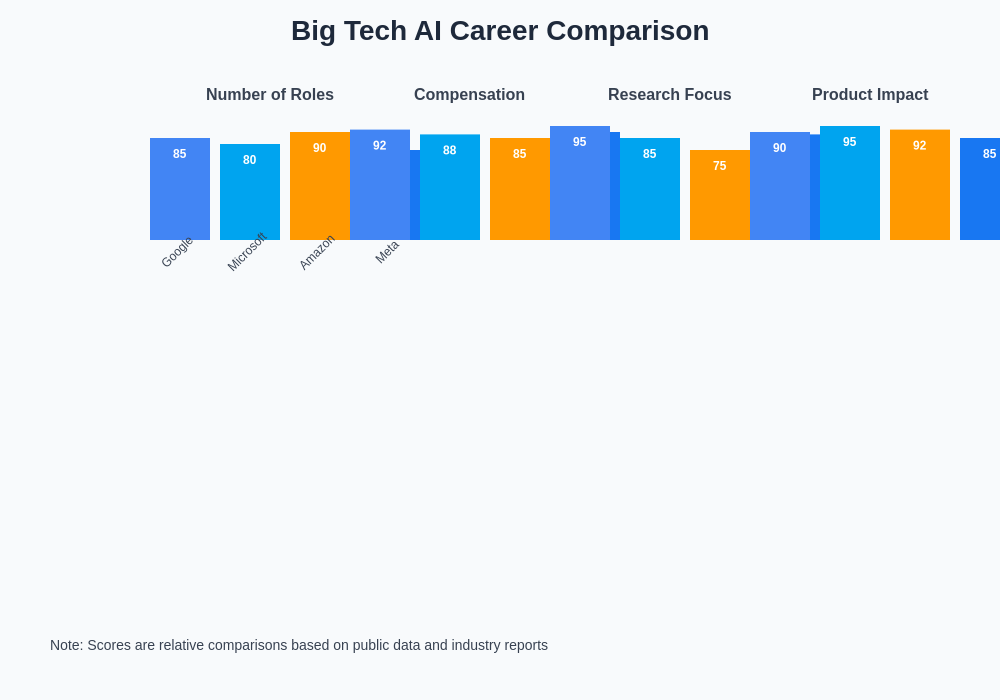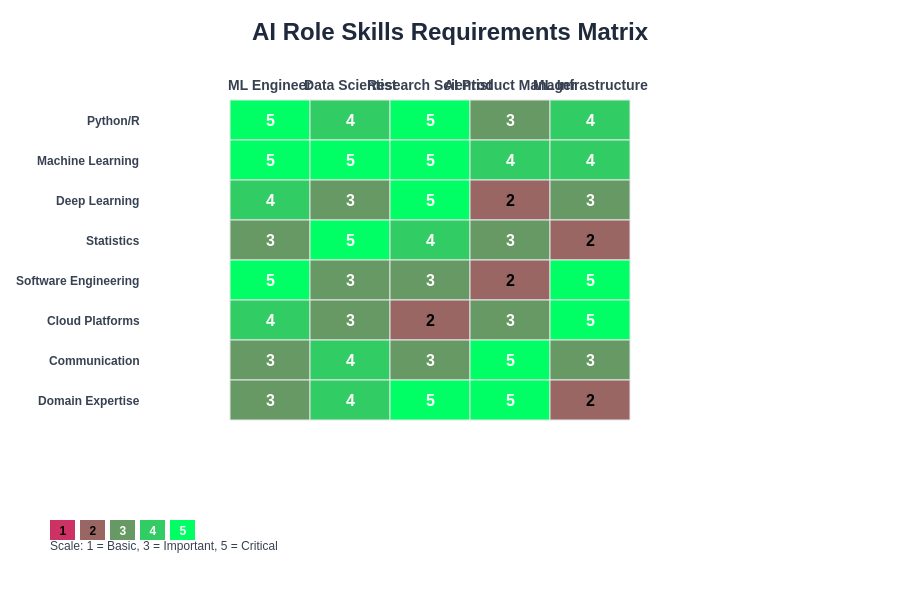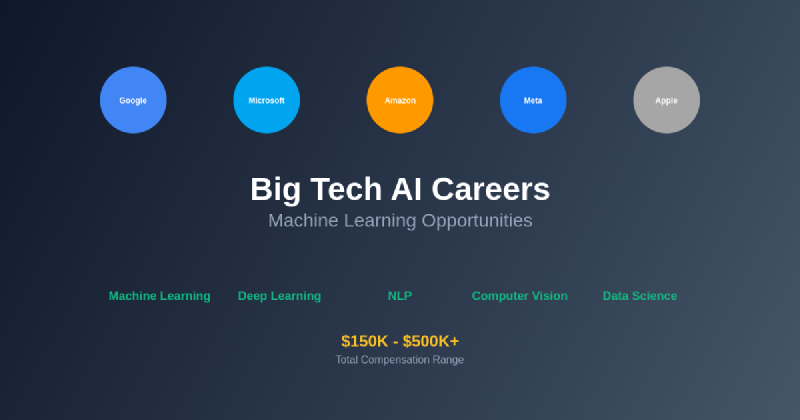The artificial intelligence revolution has fundamentally transformed the employment landscape at the world’s most prestigious technology companies, creating unprecedented opportunities for professionals seeking to build careers at the intersection of cutting-edge technology and groundbreaking innovation. Google, Microsoft, Amazon, and their peers have emerged as the epicenters of AI development, offering not just jobs but pathways to shape the future of human-computer interaction, autonomous systems, and intelligent automation across virtually every industry.
Stay updated on the latest AI career trends and opportunities as the technology sector continues to evolve at breakneck speed, creating new roles and redefining existing positions in ways that were unimaginable just a few years ago. The convergence of massive computational resources, advanced algorithms, and real-world applications has positioned these technology giants as the ultimate destinations for AI professionals seeking to work on projects with global impact and unlimited potential for innovation.
The AI Career Landscape at Major Tech Companies
The artificial intelligence career ecosystem at major technology companies has evolved into a sophisticated hierarchy of specialized roles that span the entire spectrum of AI development and deployment. These organizations have recognized that successful AI initiatives require diverse expertise ranging from theoretical research and algorithm development to practical implementation and product integration. The result is a comprehensive career framework that offers opportunities for professionals with varying backgrounds, skill levels, and specialization areas to contribute meaningfully to the advancement of artificial intelligence technology.
The scale and scope of AI initiatives at companies like Google, Microsoft, and Amazon have necessitated the creation of entirely new organizational structures dedicated to AI research and development. These structures encompass everything from fundamental research laboratories focused on pushing the boundaries of what’s possible in machine learning to product-focused teams responsible for integrating AI capabilities into consumer-facing applications used by billions of people worldwide. This expansive approach to AI development has created career paths that were previously non-existent in the technology industry.
Google’s AI and Machine Learning Opportunities
Google’s position as a leader in artificial intelligence stems from its early recognition of AI’s transformative potential and its substantial investment in research, talent acquisition, and infrastructure development. The company’s AI career opportunities span multiple divisions including Google Research, DeepMind, Google Cloud AI, and product-specific teams working on Search, YouTube, Assistant, and other consumer-facing applications. Each division offers distinct career trajectories that cater to different professional interests and expertise levels.
The research-focused positions at Google AI and DeepMind represent some of the most prestigious opportunities in the field, attracting world-class researchers and PhD graduates who are interested in pushing the boundaries of machine learning, natural language processing, computer vision, and reinforcement learning. These roles typically involve conducting cutting-edge research, publishing in top-tier academic conferences, and collaborating with leading universities and research institutions worldwide. The compensation packages for these positions are exceptionally competitive, often including substantial stock options and research budgets.
Enhance your AI skills with Claude’s advanced capabilities to better prepare for technical interviews and challenging projects at top-tier technology companies. Google’s product-focused AI roles offer opportunities to work on applications that directly impact millions of users, requiring a unique blend of research expertise and practical implementation skills that can translate theoretical advances into real-world solutions.
Software engineering positions within Google’s AI teams focus on building and maintaining the infrastructure necessary to support large-scale machine learning operations, including distributed computing systems, data processing pipelines, and model serving platforms. These roles are particularly attractive to engineers with strong backgrounds in distributed systems, performance optimization, and software architecture who want to work on problems that exist at the intersection of traditional software engineering and cutting-edge AI research.
Data science and analytics positions at Google involve working with massive datasets to extract insights that inform product decisions, improve user experiences, and identify new opportunities for AI integration. These roles require expertise in statistical analysis, data visualization, and experimental design, along with the ability to communicate findings effectively to both technical and non-technical stakeholders across the organization.
Microsoft’s Expanding AI Ecosystem
Microsoft’s transformation from a traditional software company to an AI-first organization has created extraordinary career opportunities across multiple business units and geographical locations. The company’s AI initiatives span from fundamental research at Microsoft Research to practical applications in Azure cloud services, Office productivity suite, Windows operating system, and emerging technologies like mixed reality and quantum computing. This diversification has resulted in a broad spectrum of career paths that accommodate professionals with varying interests and expertise levels.
The Azure AI division represents one of Microsoft’s fastest-growing areas for AI careers, focusing on providing cloud-based machine learning services, cognitive APIs, and AI development tools to enterprise customers worldwide. Career opportunities in this division range from research scientist positions developing new algorithms and models to solution architect roles helping enterprise customers implement AI solutions for their specific business needs. The commercial focus of Azure AI roles offers professionals the opportunity to work on AI applications with immediate business impact and measurable return on investment.
Microsoft Research continues to be a premier destination for AI researchers interested in fundamental advances in machine learning, computer vision, natural language processing, and human-computer interaction. The research division maintains a collaborative relationship with academic institutions and encourages publication of research findings, making it an attractive option for professionals who want to maintain connections to the academic research community while working on practical applications with significant resources and support.
Product integration roles at Microsoft involve embedding AI capabilities into existing products like Office 365, Windows, and Microsoft Teams, requiring professionals who can navigate the complexities of integrating sophisticated AI models into production software systems used by hundreds of millions of users. These positions demand expertise in software engineering, machine learning model optimization, and user experience design to ensure that AI features enhance rather than complicate the user experience.
Amazon’s AI and ML Career Opportunities
Amazon’s approach to artificial intelligence careers is characterized by its focus on practical applications that directly support the company’s diverse business operations while also advancing the state of the art in machine learning research. The company’s AI initiatives span from Alexa and voice computing to AWS machine learning services, recommendation systems, supply chain optimization, and autonomous delivery systems. This comprehensive approach creates career opportunities that combine cutting-edge research with immediate commercial applications.
Amazon Web Services has become a dominant platform for machine learning development and deployment, creating substantial demand for professionals who can design, implement, and support ML services used by thousands of companies worldwide. Career opportunities in AWS ML range from research scientist positions developing new algorithms and frameworks to customer-facing roles helping enterprises implement machine learning solutions for their specific business challenges. The global scale of AWS operations provides exposure to diverse industries and use cases that few other companies can match.
Leverage Perplexity’s research capabilities to stay informed about the latest developments in AI technologies and career trends that are shaping opportunities at major technology companies. The Alexa division represents one of Amazon’s most visible AI initiatives, offering career opportunities in natural language understanding, speech recognition, conversation design, and smart home integration that directly impact millions of consumers worldwide.
The retail and logistics applications of AI at Amazon provide unique career opportunities for professionals interested in applying machine learning to supply chain optimization, demand forecasting, fraud detection, and personalized recommendation systems. These roles combine traditional operations research and logistics expertise with modern machine learning techniques to solve complex optimization problems at unprecedented scale.
Amazon’s research initiatives, including the Alexa Prize competition and collaborations with universities, create opportunities for professionals who want to contribute to fundamental advances in conversational AI, natural language processing, and human-computer interaction while working on products that have immediate practical applications and commercial viability.
Emerging Roles and Specializations
The rapid evolution of artificial intelligence technology has led to the emergence of entirely new career specializations that didn’t exist just a few years ago. These roles reflect the increasing sophistication of AI systems and the growing recognition that successful AI implementation requires diverse expertise beyond traditional software engineering and data science. The creation of these specialized positions represents a significant shift in how technology companies approach AI development and deployment.
AI ethics and safety specialists have become increasingly important as companies recognize the need to ensure that their AI systems are fair, transparent, and aligned with societal values. These roles involve developing frameworks for evaluating AI systems for bias, creating guidelines for responsible AI deployment, and working with cross-functional teams to implement ethical considerations throughout the AI development lifecycle. The importance of these positions has grown substantially as AI systems have become more prevalent and their potential impact on society has become more apparent.
Machine learning engineering represents a hybrid role that combines software engineering expertise with deep understanding of machine learning systems and their operational requirements. These professionals focus on building reliable, scalable infrastructure for training, deploying, and monitoring machine learning models in production environments. The role has evolved to address the unique challenges of operationalizing AI systems, including model versioning, continuous integration and deployment for ML pipelines, and monitoring system performance in dynamic environments.
Conversational AI designers and user experience researchers specializing in AI interfaces represent another emerging specialization that reflects the growing importance of human-AI interaction design. These professionals work to ensure that AI systems are intuitive, helpful, and aligned with user needs and expectations. Their work involves conducting user research, designing conversation flows, and collaborating with engineers and researchers to create AI experiences that feel natural and beneficial to users.
Skills and Qualifications for Success
The skill requirements for AI careers at major technology companies have evolved to encompass both deep technical expertise and broader professional competencies that enable effective collaboration and innovation in complex organizational environments. Successful AI professionals typically combine strong foundations in mathematics, computer science, and statistics with practical experience in machine learning frameworks, programming languages, and software development practices.
Technical skills that are consistently valued across AI roles include proficiency in Python and R for data analysis and machine learning, experience with frameworks like TensorFlow, PyTorch, and scikit-learn, and understanding of cloud computing platforms including AWS, Google Cloud, and Azure. Additionally, knowledge of distributed computing systems, database technologies, and software engineering best practices has become increasingly important as AI systems have grown in scale and complexity.
Mathematical and statistical foundations remain crucial for many AI roles, particularly those focused on research and algorithm development. Linear algebra, calculus, probability theory, and statistical inference provide the theoretical underpinnings necessary to understand and develop machine learning algorithms. However, the level of mathematical sophistication required varies significantly across different types of AI roles, with some positions emphasizing practical implementation skills over theoretical knowledge.
Communication and collaboration skills have become increasingly important as AI projects typically involve cross-functional teams including product managers, designers, engineers, and business stakeholders. The ability to explain complex technical concepts to non-technical audiences, collaborate effectively in diverse teams, and translate business requirements into technical specifications is often as valuable as pure technical expertise.
Compensation and Career Progression
Compensation packages for AI roles at major technology companies are among the most competitive in the industry, reflecting both the high demand for qualified professionals and the significant business value that these roles create. Total compensation typically includes base salary, stock options or restricted stock units, performance bonuses, and comprehensive benefits packages that can significantly exceed the value of the base salary alone.
Entry-level AI positions at companies like Google, Microsoft, and Amazon typically offer total compensation packages ranging from $150,000 to $250,000 annually, depending on location, specific role requirements, and candidate qualifications. Mid-level positions with 3-5 years of experience can command total compensation of $250,000 to $400,000, while senior roles and principal-level positions often exceed $500,000 in total annual compensation. Research scientist positions and specialized roles may command even higher compensation, particularly for candidates with exceptional academic credentials or unique expertise.
Career progression in AI roles typically follows multiple pathways including individual contributor tracks that lead to principal researcher or staff engineer positions, and management tracks that involve leading teams and managing complex technical initiatives. Many companies also offer opportunities for lateral movement between different AI-focused teams and divisions, enabling professionals to gain diverse experience and identify their areas of greatest interest and impact.
Stock compensation represents a significant component of total compensation at these companies, and the appreciation of company stock values has contributed substantially to the wealth creation potential of AI careers. However, candidates should also consider factors like work-life balance, professional development opportunities, and alignment with personal values when evaluating career opportunities.

The competitive landscape for AI talent has intensified significantly over the past several years, with companies offering increasingly attractive packages to attract and retain top performers. This competition has benefited professionals throughout the field, creating opportunities for career advancement and compensation growth that were previously unavailable in most industries.
Application Strategies and Interview Preparation
Successfully securing AI positions at major technology companies requires strategic preparation that addresses both technical competencies and professional presentation skills. The interview processes at these companies are notably rigorous and typically involve multiple rounds of technical assessments, behavioral interviews, and presentations that evaluate candidates’ ability to contribute effectively to complex AI initiatives.
Technical interview preparation should focus on demonstrating proficiency in core machine learning concepts, programming skills, and problem-solving abilities through practical exercises and case studies. Candidates should be prepared to discuss their experience with various machine learning algorithms, explain trade-offs between different approaches, and demonstrate their ability to design and implement solutions for realistic AI challenges. Practice with coding exercises, algorithm design problems, and system design questions is essential for success in these interviews.
Portfolio development has become increasingly important for AI career applications, with many successful candidates maintaining GitHub repositories, publishing research papers, contributing to open-source projects, and documenting their involvement in AI competitions or personal projects. These tangible demonstrations of expertise and passion for the field can significantly differentiate candidates in competitive application processes.
Networking within the AI community through conference attendance, meetup participation, and online engagement can provide valuable insights into company cultures, role requirements, and application strategies. Many successful candidates report that referrals from current employees or professional connections significantly improved their chances of securing interviews and receiving favorable consideration during the application process.

Understanding the specific requirements and culture of each company is crucial for successful applications. Google tends to favor candidates with strong research backgrounds and publication records, Microsoft often emphasizes practical implementation experience and business impact, while Amazon typically values customer obsession and operational excellence in addition to technical skills.
Future Outlook and Industry Trends
The trajectory of AI careers at major technology companies suggests continued growth and evolution as these organizations expand their AI initiatives and develop new applications for artificial intelligence across diverse industries and use cases. The increasing integration of AI into all aspects of business operations and product development indicates that demand for AI professionals will continue to grow substantially over the coming years.
Emerging trends in AI development are creating new career opportunities in areas like generative AI, multimodal learning, edge computing, and AI safety research. Companies are investing heavily in large language models, computer vision systems, and autonomous agents that require specialized expertise in areas that are still evolving rapidly. Professionals who position themselves at the forefront of these emerging technologies will likely find exceptional career opportunities and growth potential.
The globalization of AI research and development is also creating opportunities for remote work and international collaboration that were previously unavailable in traditional technology roles. Many companies are establishing AI research centers in multiple countries and embracing remote work arrangements that allow them to access global talent pools and provide flexibility for their employees.
The increasing focus on responsible AI and ethical considerations is likely to create additional career opportunities in AI governance, fairness evaluation, and safety research. As AI systems become more powerful and widespread, the need for professionals who can ensure these systems are developed and deployed responsibly will continue to grow.
The intersection of AI with other emerging technologies like quantum computing, blockchain, and augmented reality is creating entirely new categories of career opportunities that combine expertise in artificial intelligence with knowledge of complementary technologies. Professionals who develop expertise across multiple emerging technology areas will likely find unique opportunities to work on groundbreaking projects that define the future of technology.
Disclaimer
This article is for informational purposes only and does not constitute professional career advice. Compensation figures and role descriptions are based on publicly available information and industry reports, and actual opportunities may vary significantly based on individual qualifications, market conditions, and company-specific requirements. Readers should conduct thorough research and consider their individual circumstances when making career decisions. The technology industry is highly dynamic, and information about specific companies and roles may change rapidly.
